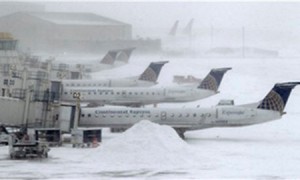The Winter of Our Discontent
 The yearly onset of winter has been a critical milestone in our history, life for that matter, on this planet. It triggered severe constraints in access to food, travel, safety and the quality of life overall. Travellers who needed to get across mountain ranges had to make tough choices, and often make winter quarters and postpone travel until the thaws. Even in war, some armies huddled in winter and fought from early spring to late fall. Today, winter continues to constrain and often reminds us that our advancement and technology can be humbled by severe weather. Those in the tropics see a different face of nature, the tropical cyclones and monsoons.
The yearly onset of winter has been a critical milestone in our history, life for that matter, on this planet. It triggered severe constraints in access to food, travel, safety and the quality of life overall. Travellers who needed to get across mountain ranges had to make tough choices, and often make winter quarters and postpone travel until the thaws. Even in war, some armies huddled in winter and fought from early spring to late fall. Today, winter continues to constrain and often reminds us that our advancement and technology can be humbled by severe weather. Those in the tropics see a different face of nature, the tropical cyclones and monsoons.
This winter’s snow storms have rolled in with a frightening frequency, size, and impact. For travellers, their effects have been far reaching. Our highly networked transportation systems suffered from and precipitated aftershocks, stranded trains, planes, automobiles, pedestrians, and passengers, … , felt well outside the snowed in airports, streets and terminals. For airlines, this winter has caused the most flight cancellations on record. With steep fines brought on by regulatory “bill of rights” constraints, risking “maybe” flights have far too much downside risk making flight cancellations the less costly alternative. The broad brush of regulation brings on predictable rigidity for the many in order to control the few. Airline losses from storm cancellations exceed $600 million with plenty of winter still left.
The impacts on businesses and enterprises are incalculable, but many economists believe that the adversity this winter has wrought will be felt by many for years to come. The fragility brought on by the forces of nature affects some enterprises more than others. If a business requires travel, face to face transactions, or physical accessibility, the consequences are more severe than those that don’t. Brick, mortar, asphalt and place bring unavoidable rigidity. While technology has increased the effectiveness and efficiency alike, value does not arise until customers derive the benefits they seek. Discussions about lean and waste eventually come to what adds value and what are currently unavoidable costs.
I like to use the story of two business partners, one in New York and the other in London. The year is 1711, and the partners must meet twice a year to review contracts, strategies and business direction. They will alternate venues. The meetings run about six hours. So, one partner travels for eight weeks on a galleon through whatever the seas bring to get to the meeting. Two hundred years later, their descendants repeat the process, but now travel eight days by steamship and 100 years later the subsequent pair makes the trip in eight hours by air. Improvement in travel reduced wasted time, but it was still wasted. One could argue that all of the time in the six hour meetings added value, but that is arguable by anyone who endures six hour meetings. Video conferencing changed the game, no travel with all meeting. The web changed the world and how we look at it.
Blockbuster is in bankruptcy, the iTunes world has replaced music cd media, streaming has replaced the rest, Microsoft has replaced boxed software executives with those who can reach the cloud, AOL has purchased Huffington in order to re-enter the way we access information and content.
Looking back on this winter, what would we have done differently if we knew then that it was coming? Would we have been stranded or connected?

